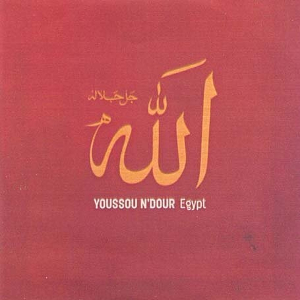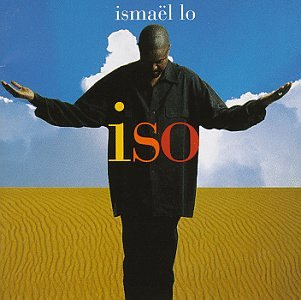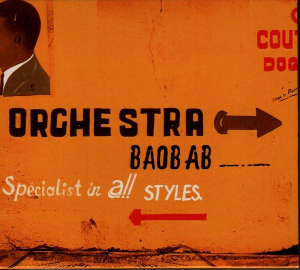
Youssou N'Dour is a Senegalese singer, songwriter, musician, composer, occasional actor, businessman, and politician. In 2004, Rolling Stone described him as, "perhaps the most famous singer alive" in Senegal and much of Africa and in 2023, the same publication ranked him at number 69 on its list of the 200 Greatest Singers of All Time. From April 2012 to September 2013, he was Senegal's Minister of Tourism.

Senegal's music is best known abroad due to the popularity of mbalax, a development of conservative music from different ethnic groups and sabar drumming popularized internationally by Youssou N'Dour.

Mamadou "Jimi" Mbaye is a Senegalese guitarist best known for his work with Youssou N'dour. Mbaye has developed a unique Senegalese guitar style in which he makes his Fender Stratocaster sound like local instruments such as the kora or xalam.

Orchestra Baobab is a Senegalese band established in 1970 as the house band of the Baobab Club in Dakar. Many of the band's original members had previously played with Star Band de Dakar in the 1960s. Directed by timbalero and vocalist Balla Sidibé, the group featured saxophonists Issa Cissoko and Thierno Koité, two singers, two guitarists and a rhythm section with drums, congas and bass guitar. Since their formation, the band has predominantly played a mix of son cubano, Wolof music, and to a lesser extent Mande musical traditions. Following the deaths of Cissoko in 2019 and Sidibé in 2020, Thierno Koité has become the leader of the band.

The Wolof, the largest ethnic group in Senegal, have a distinctive musical tradition that, along with the influence of neighboring Fulani, Tukulor, Serer, Jola, and Malinke cultures, has contributed greatly to popular Senegalese music, and to West African music in general. Wolof music takes its roots from the Serer musical tradition, particularly from the Serer pre-colonial Kingdom of Saloum. Virtually all Wolof musical terminology including musical instruments comes from the Serer language.
Mbalax is the national popular dance music of Senegal and the Gambia. In the 1970s, mbalax emerged as the distinctive sound of postcolonial Senegal. Derived from a fusion of indigenous Wolof sabar drumming with popular music principally from the African diaspora and African popular music, and to a lesser extent Western pop and afropop. Although the fusion of indigenous music with urban dance music from the diaspora and west is not new, the pan-ethnic quality of urban Wolofness provided a space for the inclusion and representation of a plethora of ethnic sounds of the Pulaar/Tukulor, Sereer, Soce, Mande and other groups from the Greater Senegambia Region. The name mbalax derives from the accompanying rhythms of the Wolof sabar and was coined by Youssou N'Dour even though, as he has stated, there were many other groups in urban Senegal fusing these traditional sounds with modern music.
Ashley Maher is a Canadian singer and songwriter who has meshed the rhythmic impulses of West Africa and Latin America with Western song structures.
Mbaye Dieye Faye is a Senegalese singer and percussionist.

Alioune Palla Mbaye dit « Nder » is a Senegalese singer. Nder takes his name from the n'der, the drum favoured by his griot father.
Habib Faye was a bassist, keyboardist, guitar soloist, arranger, composer and Grammy-nominated producer from Senegal. He was mostly known as the musical director for Youssou N'dour's Super Étoile de Dakar. He was one of the most talented African bassists of the last quarter-century.

Egypt is a Grammy Award-winning album by the Senegalese musician Youssou N'Dour, on which he is accompanied by the Egyptian Fathy Salama Orchestra. By incorporating Arabic influences and focusing on Muslim religious themes, the album was a departure from previous N'Dour releases. In the original Senegalese release, it was named Sant Allah.

Immigrés is an album by Senegalese singer and percussionist Youssou N'Dour. AllMusic remarks that the album is "a good part of what put [N'Dour] on the international map".
Star Band is a music group from Senegal that was the resident band of Dakar's Miami Club. They, along with the many off-shoots of the band, are responsible for many of the crucial developments in Senegalese popular music. They were formed in 1959 by the owner of the Miami Club, Ibra Kasse. As was typical in Africa at the time, Kasse owned the instruments and was the band leader of the Star Band although he only occasionally played piano. Each one of the band's twelve albums released in Senegal featured a photo of Kasse on the back cover stating that he was the band leader, composer and arranger.

Iso is an album by Ismaël Lô, released in 1994. The album contains soft guitar melodies, and traditional Senegalese mbalax. It peaked in the top 10 on Billboard's World Albums chart.
Titi, also known by her real name Ndeye Fatou Tine, is a singer from Senegal. Her name of Titi comes from a nickname given to her as a child by her uncle. She started her career as a dancer but was inspired by Youssou N'Dour and moved on to becoming a singer. As a dancer she performed with Papa Ndiaye Thiou and also appeared in music videos of Senegalese stars such as El Hadji Faye and Pape Djiby Ba.
Étoile de Dakar were a leading music group of Senegal in the late 1970s and early 1980s. Youssou N'Dour was one of the singers in the band and the band was a major part of N'Dour's rise to stardom in Senegal.

The Lion is an album by Youssou N'Dour, released in 1989. It was his first album to be distributed on a global scale.
The Njuup tradition is a Serer style of music rooted in the Ndut initiation rite, which is a rite of passage that young Serers must go through once in their lifetime as commanded in the Serer religion.

Specialist in All Styles is an album by the Senegalese band Orchestra Baobab, released in 2002. After the success of the Pirates Choice reissue, the band decided to record a reunion album. It was Orchestra Baobab's first album in 15 years. The album title was taken from a sign hanging outside a barbershop.

Eyes Open is an album by the Senegalese musician Youssou N'Dour, released in 1992 via Spike Lee's 40 Acres and a Mule Musicworks label. A video was shot for "Africa Remembers". N'Dour supported the album with a North American tour. Eyes Open was nominated for a Grammy Award, in the "Best World Music Album" category.












